Goings On at Bouchercon
Due to a continuing misunderstanding with Homeland Security (who seem reluctant to accept ‘Downton Abbey’ as the address of my second home), I was unable to attend the international crime fiction convention known as Bouchercon held in Ohio, which I believe is one of those United States, last month.
I am still awaiting a full debrief from the Shots staff who did attend, but rumours on the jolly old interweb suggested that millionaire playboy Prince Ali Karim has been up to his old tricks again.
An early report, by one Peter Rozovsky on “Detectives Beyond Borders” began with the ominous words: Bouchercon is not all about debauchery, gin, and back-scratching. It's sometimes easy to forget that the conference is, at root, a gathering of people who love books and reading. I find that disturbing on a personal level as I had assumed that I had been missing out on my fair share of gin, back-scratching and particularly debauchery by not attending; but worse was to follow.
So, while Ali Karim naturally had his fellow diners spitting up pizza through their noses at last night's dinner, we also talked about crime writers and books we loved.
What on Earth was Prince Ali doing at the Bouchercon High Table? I really do hope it wasn’t his party-piece interpretation of ‘Hannibal Lecter’s Greatest Hits’ using sock puppets and a tube of tomato purée. Goodness knows we’ve asked him not to do that in polite company on numerous occasions.
Oddly, photographs of Prince Ali up to his old tricks at Bouchercon are difficult to find, even on the jolly old interweb. However, once back on British soil (on which he spends a limited amount of time for tax reasons), there he was, up to his old tricks again.

It is no surprise to me to hear that no-one has seen anything of that erudite and much-cherished British institution Mr Stephen Fry since he was cornered at a fashionable cocktail party in London’s West End by the socialite Karim. One fears that Mr Fry has become the latest “trophy” of Prince Ali and is currently a prisoner in one of the millionaire playboy’s secret warehouses amidst his vast and rather ghoulish collection of Steig Larsson memorabilia.
*
Bouchercons are splendid institutions, a bit like meetings of the United Nations, but with better jokes and, usually, less violence. They are conventions named in honour of American author and critic William Anthony Parker White (1911-1968), or rather his pen-name: Anthony Boucher.
His name came up as I was relaxing with the obligatory vodka martini on James Bond Day, which is now a national holiday in the UK by order of Her Majesty (herself a Bond Girl since the London 2012 Olympics). I did not know, but I read in The Times, so it might be true, that Ian Fleming’s Dr No began life as a film treatment and was then turned into the novel first published in 1958, when Anthony Boucher reviewed it for The New York Times thus: ‘It is 80,000 words long, with enough plot for 8,000 and enough originality for 800.’
I think that a bit of a harsh verdict though by the time I was deemed old enough to read Dr No, the film had come out (in1962) and the book had sold more than 1,500,000 copies. It has sold many more since and indeed, there was a new edition, with an Introduction by Sam Bourne (a.k.a. Jonathan Freedland), only this year.
*
Like all good conventions (i.e. American ones) Bouchercons are followed up with ‘after-parties’, book tours, press interviews, hangovers, therapy sessions and unpleasant letters from your credit card companies.
One author enjoying an extended promotional tour for his own novels and the anthology Books To Die For, for which contributors (and I would like it noted that I was not one) were paid in bottles of a very rare Irish whiskey, was John Connolly. In the great state of North Carolina, which will itself host a Bouchercon in 2015, John was meeted, greeted and chaperoned by the state’s most-lauded mystery writer Margaret Maron, who was the winner of this year’s Agatha Award at the Malice Domestic convention for her novel Three Day Town.
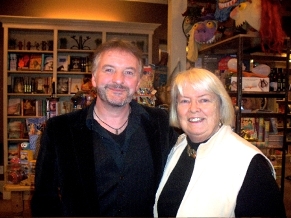
I Don’t Know If It’s Art, But…
For many years my old chum Ruth Dudley Edwards has used her comic ensemble cast (headed by Baroness Ida ‘Jack’ Troutbeck, Robert Amiss and the cat Plutarch) in a series of crime novels which put the satirical boot into, among other things: the House of Lords, the Northern Ireland peace talks, academic life (and death) in a Cambridge college and, of course, Americans.
Now, in Killing The Emperors, published by Allison & Busby later this month, Ruth takes a chain saw to the world of ‘conceptual art’ allowing the wonderfully politically incorrect Baroness Troutbeck (a truly great comic character in danger of becoming a National Treasure) to spew bile and opprobrium on the heads and bank balances of just about every contemporary artist with the exception of David Hockney, who passes muster because ‘he does landscapes’ now.

Coming in for particular stick are conceptual artists who have displayed sharks in tanks, pickled lambs, unmade beds, neon signs and millions of sunflower seeds (no name; no libel suits), plus the gallery owners and rich patrons who encourage and finance the entire circus.
Baroness Troutbeck could be a gold medalist if putting both feet in the mouth whilst speaking was an Olympic sport and in Killing the Emperors she has to call on every ounce of natural invective energy in order to save herself and nine other movers-and-shakers of the modern art world kidnapped by a bankrupt Russian oligarch gone totally bonkers who is out for revenge on those who have sold him ‘art’.
The plot moves seamlessly from the sublime to the ridiculously sublime when it becomes clear that the kidnap victims are being held in a Big Brother style house and are forced to produce increasingly ridiculous pieces of modern ‘art’. Any hostage who fails to make the grade is quietly ‘evicted’, murdered and their bodies discovered in a suitably ‘artistic’ setting.
There are some great jokes in this book and even if the targets are not that difficult to hit for a satirist of Ruth’ s standing, one is left in no doubt that this is a subject close to her heart and one she has been seething about for several years.
So what next for the formidable Baroness Troutbeck? (Spoiler Alert: she survives – of course she does). How about the use of Sock Puppets, dodgy reviews and slagging-off fellow crime-writers on the internet and Twitter (whatever that is) and all the palaver of making public apologies afterwards? Surely that incestuous world must be a suitable target for Ruth’s barbed wit.
In fact I will suggest it to her the next time she takes me for a sumptuous luncheon at one of the many fine London clubs where she is a member. In fact, if memory serves, which it rarely does these days, it is coming up to twenty years since I first met Ruth Dudley Edwards in, I think, the Reform Club, where the late Sarah Caudwell introduced us and a jolly luncheon ensued.
Thankfully, there was no CCTV in those days; and surely the staff will have forgotten by now….
The Spies Have It
It was a delight – it always is – to meet up with Len Deighton in London last month where, among other topics (some of national importance) we discussed the emotional significance of the moment when a reader buys their very first hardback novel.
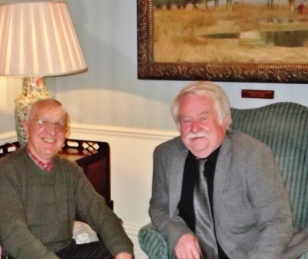
For Len, this was the famous Indian novel Coromandel! by John Masters, but I failed to save his blushes when I admitted that mine had been Billion Dollar Brain by…er…Len Deighton and , coincidentally, Rob Mallows (who runs the excellent Deighton Dossier blogspot) has recently acquired some of the promotional items which accompanied the publication of Billion Dollar Brain.
Among them was a facsimile, designed by the legendary Raymond Hawkey, of one of the notebooks used by Len whilst researching the book in Finland and Russia, which was quite fascinating. I cannot, however, remember such an item accompanying my copy of the book (though I think I got a Honeywell computer punch card as a book mark!).I wonder if it is too late to demand a refund.
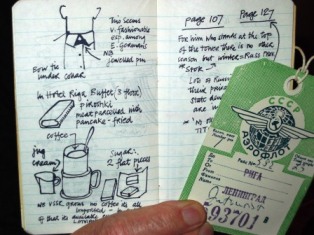
And if one spooky coincidence was not enough, on my return to Ripster Hall I found a copy of Dan Fesperman’s new novel The Double Game (published by Corvus in December) awaiting my attention.
I remember Fesperman’s debut novel Lie in the Dark, set in war-torn Sarajevo, rightly winning the John Creasey Award some years ago and his work has subsequently won several other awards. The Double Game is not only a spy story, but it’s a spy story about spies who read (and write) spy stories and in the early pages, the narrator details the moment he was introduced to the spy fiction of (fictional) writer Edwin Lemaster by his father in 1969: “Within days I was pillaging his shelves for the equally timely glories of John le Carre, Len Deighton and Adam Hall. Eventually I turned to earlier classics by Maugham, Buchan, Ambler and Greene.”
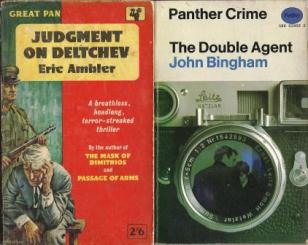
Now at this point, I began to do a quick stock check of my shelves, just to make sure that Dan Fesperman had not broken in to my study in pillaging mood, for the books he began to quote from (the passages being clues in his plot) seemed remarkably familiar. Two in particular ringing distinct bells: Eric Ambler’s Judgment on Deltchev and John Bingham’s The Double Agent.
Much of The Double Game revolves around ‘Edwin Lemaster’, an ex-CIA agent turned spy writer who becomes widely read by spies both past and present. A few years before the fall of the Berlin Wall, Lemaster is interviewed by young journalist Bill Cage (himself the son of an American ‘diplomat’) and lets slip that, when an active spook, he had once considered defecting. When Cage writes up the interview it causes a minor sensation, much to Cage’s embarrassment but thirty years later, Cage is drawn into ‘Operation Lemaster’ by a series of cryptic ‘Moscow Rules’ type clues which take him back to the Europe, and the spy novels, he was brought up with. Instead of just reading about it, Cage finds himself an active player in the ‘double game’ of spying.
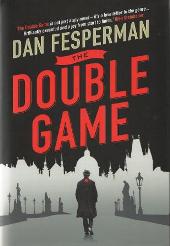
The Double Game is, for anyone who has ever read a spy story, fantastic fun. It is knowing and knowledgeable about the genre and comes with an almost perfect bibliography of spy novels (I say ‘almost’ as I would have found room for Alan Furst, David Brierley and Charles Cumming) including a complete list of the works of ‘Edwin Lemaster’ which, with the possible exception of his 1969 debut Knee Knockers, all sound jolly exciting.
On Mulholland Drive
I may have misunderstood – I often do – but I thought that the Mulholland Books imprint of British publisher Hodder & Stoughton was set up to bring us the latest in gritty, cutting-edge, hard-boiled crime fiction, mostly of American origin. Their list of authors seems to suggest that, as it contains names such as Joe Lansdale, Marcia Clark, Greg Rucka, Nick Santora, Duane Swierczynski and the legendary David (“Rambo”) Morrell.
So I was both proud and pleased to learn that in 2013, Mulholland are to publish no less than 35 books by that cutting-edged British modern master of the gritty and the hard-boiled….Leslie Charteris, whose books featuring Simon Templar –‘The Saint’– were first published in those heady years between 1928 and 1963.
Making a Hobbit of Writing
In terms of promoting the family business, Simon Tolkien, the grandson of J.R.R. Tolkien, couldn’t have picked a better time to publish his new thriller given the much-anticipated release of The Hobbit in cinemas next month.
Orders From Berlin (HarperCollins) however, is set nowhere near Middle Earth, but rather in London in 1940 and revolves around a plot to assassinate Winston Churchill.
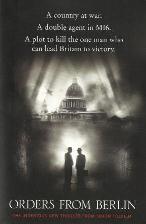
Without taking anything away from Simon Tolkien’s book, the setting reminds me of one of his grandfather’s finest hours when, in 1938, a German publisher made an offer for a German edition of The Hobbit. Being controlled by the Nazis, the publishers wanted assurances that Tolkien was of pure Aryan race, to which he replied: “If I am to understand that you are enquiring whether I am of Jewish origin, I can only reply that I regret that I appear to have no ancestors of that gifted people.”
And once war broke out, he had no hesitation in describing Hitler as “that ruddy little ignoramus”.
Double Edged Weapon
It seems that the way for an unknown author to get published in book form these days is to first self-publish as an e-book, sell thousands of downloads at a very low price, thus becoming a “phenomenon” (the current jargon) and then be snapped up by a publisher. This is not a technique exclusive to new, debutant writers, but more and more established authors are following suit, by-passing that tiresome process where publishers actually have to read manuscripts.
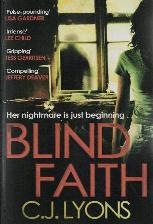 American C.J. Lyons is an established name in the world of thrillers and romantic fiction, but her latest to be published in the UK, Blind Faith, was, I am told, a ‘self-publishing phenomenon…(which)…sold hundreds of thousands of copies’. American C.J. Lyons is an established name in the world of thrillers and romantic fiction, but her latest to be published in the UK, Blind Faith, was, I am told, a ‘self-publishing phenomenon…(which)…sold hundreds of thousands of copies’.
The only problem I can see with this technique is that being self-published and electronic, the writer is totally at the mercy of customer reviews on Amazon and I do not mean ‘Sock Puppets’ (though some may be involved) but rather real customers, who seem to be keener to submit a review when they have spent 99p (or less) on a download than, say, £7.99 on a paperback.
Taking Blind Faith as an example, I discovered that on Amazon US, there were 137 customer reviews in the first six months of the book being available as a 99-cent download, which is more than for Leo Tolstoy’s War & Peace, which probably says something though I’m not sure what.
To be fair, there are twice as many 5-star reviews (the vast majority from women) as there are 1-star criticisms, with relatively few customers/readers adopting a middle ground. Human nature being what it is (usually brutish and cruel), the eye is automatically drawn to the less favourable comments which show a level of bile I find quite surprising considering the financial “loss” incurred by the downloader was no more than 60p.
Among the comments: ‘made me cringe,’ ‘nothing to recommend it,’ ‘mis-spellings, grammatical errors, poorly written,’ ‘the chick-lit answer to Ken Follet,’ ‘shoot it and put it out of its misery’ and, even though it took me a few moments to work it out: ‘Too many W.T.F. moments.’
In my eighteen years as a newspaper reviewer of crime fiction, my philosophy was usually that if you couldn’t say something good about a book, it was probably best to say nothing at all. This was a Rule of Life adopted by my mother when it came to people rather than books and a rule she stuck to throughout her life with the notable exception of Adolf Hitler and, with great prescience, Jimmy Savile.
|
|
Dear Agatha
It is the 20th anniversary of a famous crime fiction Agatha – no, not that one, but Agatha Raisin, the scourge of the Costwolds crime scene, as created by the immensely successful, prolific and very charming Marion (‘M.C.’) Beaton.
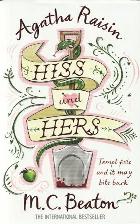
To celebrate the event, the hard-talking, gin-drinking private detective returns in Hiss and Hers (Constable & Robinson) which is, I believe, her 23rd adventure in novel form since her debut in thewonderfully-titled Agatha Raisin and the Quiche of Death back in 1992.
Elementary
For legal reasons I was unable to attend the recent Crime Writers/Specsavers/ITV 3/ Crime Thriller Awards (or whatever they are called this year). Out of deference to some good chums and chumettes in the crime writing world, I refrained from making any predictions as to who would win the many awards up for grabs although the footlights were firmly aimed at the thespian rather than the writing profession.
On that side of things, I did make some predictions and apart from Tinker Tailor Soldier Spy, managed to get them spectacularly wrong as usual. However, I have no problem with the fact that the latest television incarnation of Sherlock seemed to sweep the board and, with excellent timing, BBC Books have produced Sherlock The Casebook just in time for Christmas.
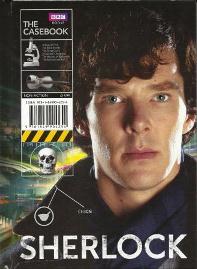
It really is a splendid tribute to the Great Detective and his re-imagining for the BBC in the 21st Century and the perfect stocking-filler for fans old and new, despite the warning “endorsement” which comes from the curmudgeonly Sherlock himself: ‘Don’t buy this book. The author has transformed what should have been a series of lectures into a gross and tasteless entertainment.’ For once, Sherlock doesn’t know what he’s talking about; this is a treat.
Seasonal Reading
My own Christmas reading schedule is already alarmingly full thanks to the generosity of publishers who have sent me advanced proofs of books appearing in early 2013, which I can hardly wait to consume in front of a roaring fire, under a fir tree heavy with low-hanging sweetmeats and with a firkin of barley wine close at hand.
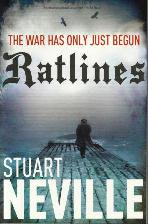
I remember being knocked out by Stuart Neville’s violent debut The Twelve a couple of years ago. Now his fourth novel Ratlines (from Harvill Secker) promises to raise a similar stir – and probably a few hackles along the way – with its digging into a particularly shadowy bit of Ireland’s trouble history. This time, though, the usual suspects are not the ones you might usually expect; it is those reliable go-to villains, the Nazis.
I did not know, but as it’s in Stuart’s book I am willing to believe it, that after WWII Ireland offered sanctuary to Nazis fleeing the retribution of the Allies in Europe. In 1963, on the eve of President Kennedy’s visit to Ireland, somebody decides to start murdering them and an Irish intelligence agent is faced with the dilemma of having to protect the enemies he was fighting twenty years before.
Nazis are quite active too in Sam Eastland’s The Red Moth (from Faber in February) because it is 1941 and they’ve just invaded Russia. That and the name ‘Pekkala’ should be enough to tempt fans of this excellent series of historical thrillers featuring the Finnish investigator who once worked as Tsar Nicholas’ personal detective but, by 1941, is serving an even more authoritarian figure: Joseph Stalin.
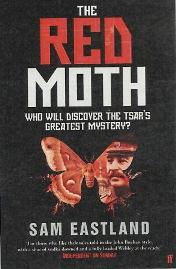
That the Inspector Pekkala books, of which this is the fourth, are brilliantly researched and immaculately written should come as no surprise given that the name ‘Sam Eastland’ hides the identity of Paul Watkins, the author of some splendid novels such as Calm At Sunset, Calm At Dawn, Thunder God and The Ice Soldier.
I am aware that one of Sam Eastland’s Pekkala thrillers has been short-listed for the Ellis Peters Award for historical mysteries but my strong advocacy of it was almost certainly the reason it did not win. Consequently I will not mention that award in the same breath as Andrew Taylor’s The Scent of Death, which is published by HarperCollins in February, but I am keen to read the book, which is set in British-run New York in 1778.

Resisting (strongly) the urge to say that those were the days; I really am looking forward to this book by an author who has actually won the Ellis Peters Award twice. Dare I say that 2013 could bring the hat-trick? No, I’d better not.
Before I settle down to indulging myself with these new treats, in between roasting chestnuts and stuffing mince pies with brandy butter, I must clear the decks and finish the books of a slightly older vintage which I currently have ‘on the go’.
One of these is John Buchan’s 1916 spy story Greenmantle which stars Richard Hannay and is remarkably good, although it has always been overshadowed by The 39 Steps where Hannay is hunting spies as opposed to being a spy in enemy territory as he is here in Buchan’s second novel.
The plot concerns Hannay (and friends) attempting to infiltrate a German plot to stir up an Islamist jihad uprising in the Middle East during World War I and involves a hazardous undercover journey across war-torn Europe, the Austro-Hungarian Empire and the Ottoman Empire. Although certainly jingoistic in tone in places (and oddly sympathetic to Kaiser Wilhelm II in others), the book was a great success in its day and is said to have been a favourite of the Russian Imperial family and, subsequently, of Graham Greene and Alfred Hitchcock, who (it is rumoured) wanted to film it instead of 39 Steps but could not get the rights!
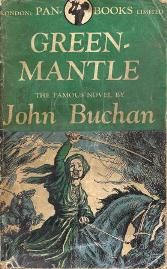
Famously a BBC Radio 4 serial adaptation of the book was cancelled halfway through broadcasting because it was thought the subject matter was too sensitive in the wake of the July 2007 London bombings, even though the inspiration for the book is clearly the ‘Mahdi’ uprisings of the late 19th century and the villains of the piece are the German military.
One forgets how popular – and prolific – John Buchan was. It is said that in the 1920s, when Agatha Christie was being offered £25 a book by publishers, Buchan was earning a minimum of £5,000 a year from his novels, of which he wrote around thirty, plus numerous collections of short stories. One of these collections, The Runagates Club in 1928, used the mechanism of that ‘curious organism’ the ‘London dining-club’ as a fictional excuse for young men who ‘had been leading queer lives’ (during WWI) to tell stories. Among the members was ‘the Greek scholar who had captained a Bedawin (sic) tribe.’ Lawrence of Arabia anyone?
The other ‘golden oldie’ I have to finish before the year ends is The Sands of Windee, written in 1931 by Arthur Upfield and featuring the ‘half-caste’ Aborigine detective Inspector Napoleon Bonaparte. Although I managed to avoid the works of that prolific Australian crime writer for many decades, I am determined to complete my crime fiction education, especially as I believe this particular book was used as a text book for a real ‘perfect murder’ in Australia and also because my old friend the late Harry Keating recommended it in his Crime & Mystery - The 100 Best Books in 1987 despite it being ‘written in leadenly ponderous prose’.
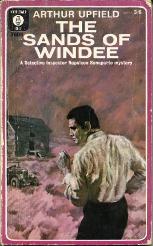
Now virtually forgotten in this country, Arthur Upfield was for many years the leading figure in Australian crime writing and his mystery stories, which put European methods of detection into practice in the Australian outback found a large and enthusiastic audience in the USA thanks to the large numbers of American servicemen stationed there during WWII who became firm fans.
Neighbourhood Watch
I am delighted for my near neighbour Jonathan Gash, who has not had the best of health lately, that his ‘Lovejoy’ books – which put many parts of East Anglian life and landscape well and truly on the map – are to be reissued as trade paperbacks and e-books by Constable and Robinson.
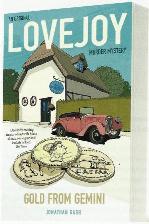
The first four titles to appear in March 2013 are the first four in the long-running series: The Judas Pair, Gold From Gemini, The Grail Tree and Spend Game, which date from the years 1977-1980.
Top Notching
And speaking of notable reissues, which I do at the drop of a hat, I feel I must mention the latest titles from the utterly brilliant imprint that is Top Notch Thrillers. (Other imprints may be available.) They are the brace of thrillers which, in 1973 and 1974, promoted career army officer Clive Egleton to bestselling writer in the Alistair Maclean bracket.
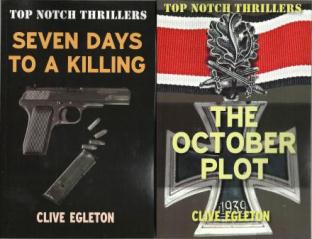
Egleton’s wartime thriller The October Plot (about an attempt to assassinate Martin Bormann) ranks for many alongside Maclean’s earlier Where Eagles Dare and Jack Higgins’ later The Eagle Has Landed and was the subject of considerable ‘buzz’ and ‘hype’ within the publishing trade when it first appeared.
It was however Egleton’s previous novel (his fourth) which secured his break-through. Film rights to the spy thriller Seven Days To A Killing were snapped up by legendary American director Don Siegal as he basked in the success of Dirty Harry. It is still fairly obvious why the plot of Seven Days appealed to the director of Dirty Harry as the tension is carefully wound up to bloody climaxes in both. What is less understandable is why the film version, starring Michael Caine, Janet Suzman and Donald Pleasance, was re-titled The Black Windmill.
The reason seems to have been that Don Siegal, whilst in England, had spotted the filmic potential of the historic Clayton Windmills on the Sussex Downs and decided to stage the final dramatic shoot-out there. (In the book it’s a farmhouse.)
Ménage à Trois?
I have heard of husband-and-wife writing teams in crime fiction, even cousins, mothers-and-sons and twin sisters.
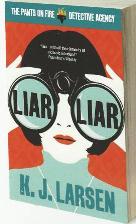
But until now I had never come across a trio of sisters collaborating in crime writing. It seems that K.J. Larsen is the combined pen-name of sisters Kari, Julianne and Kirsten Larsen, whose first novel Liar Liar is published in the UK in March by Head of Zeus.
The Annual Cull
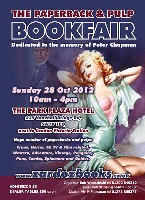
I was unable to attend the Paperback and Pulp Book Fair in London last month as it clashed with the annual cull of books here at Ripster Hall.
It is a long tradition now whereby I thin the groaning shelves of the many libraries here and allow tenants of the estate and local villagers to purchase at modest prices, titles which I have decided are surplus to my requirements but may help spread a little literacy.

Such is the popularity of this annual event that I have had to resort to employing members of Her Majesty’s hard-pressed armed forces (this year the Irish Fusiliers) to perform security duties, prevent pilfering and guard my leather-bound copies of 50 Shades of Grey.
Talking Books
One has to feel sorry for today’s high-powered executives in the world of publishing for they are so ‘time poor’ they simply do not have a moment to read a good book and volunteers are desperately needed to provide the vital service of reading to them, whilst there is still time.
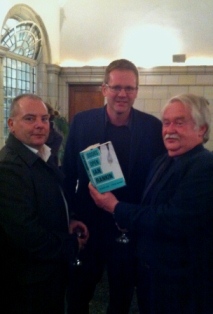
At a secret location in London recently, Shots editor Mike Stotter and myself took it in turns to read extracts from Ian Rankin’s Doors Open to Orion supremo Jon Wood in order to save the man valuable minutes in his hectic schedule. We did not seek payment or thanks, rather we see it as our duty to the industry to preserve such ancient skills.
Pip! Pip!
The Ripster
|